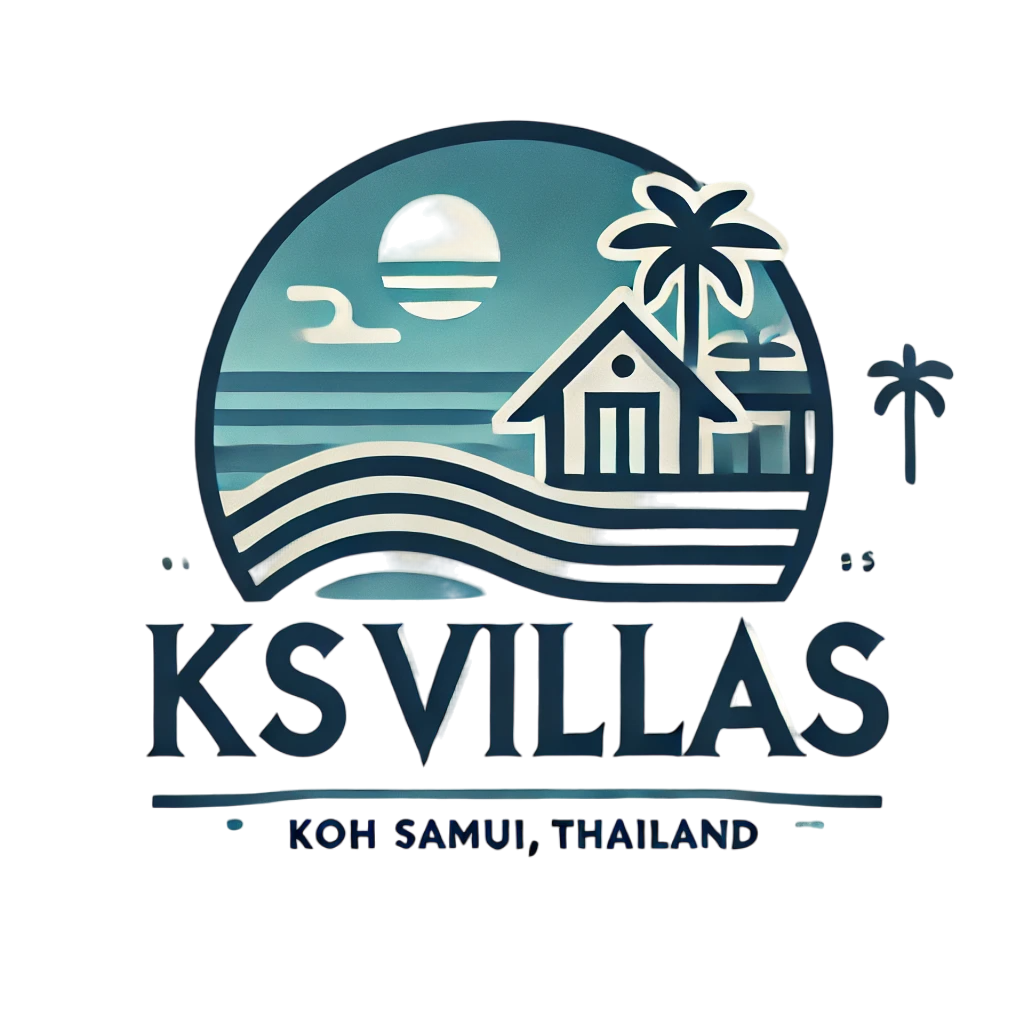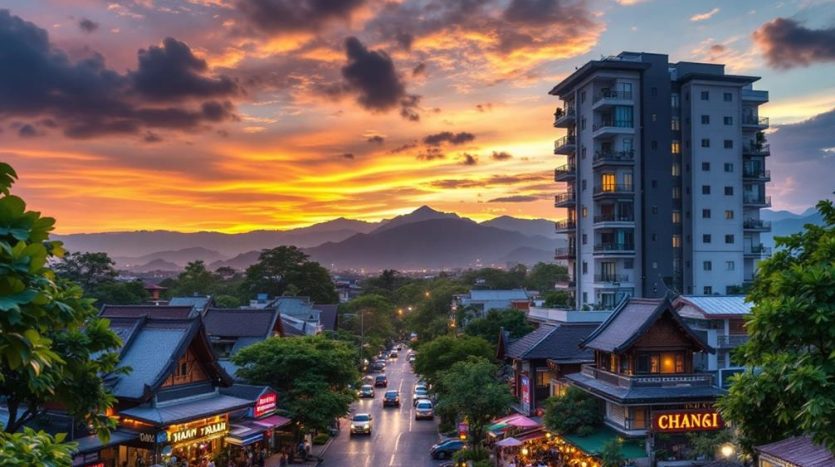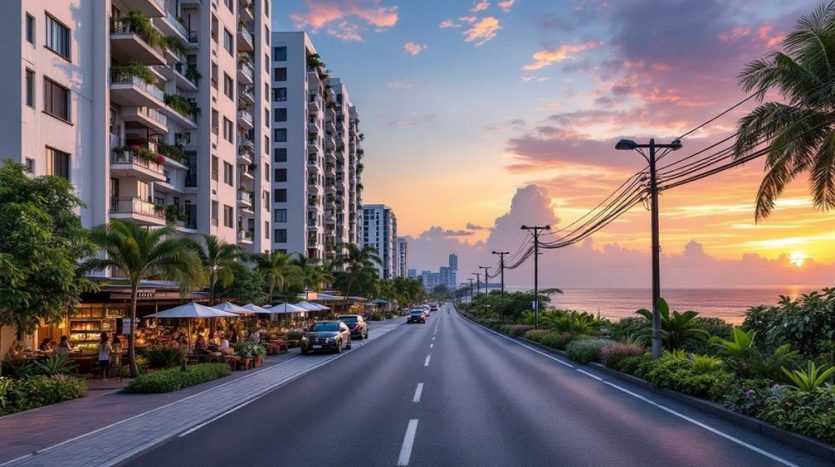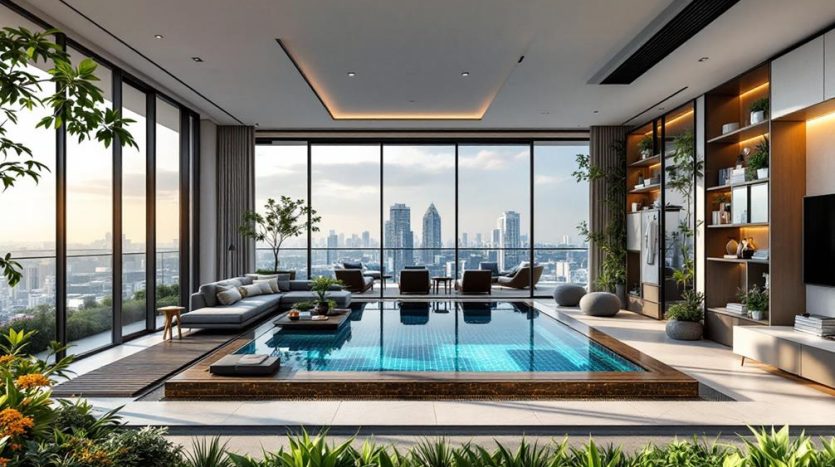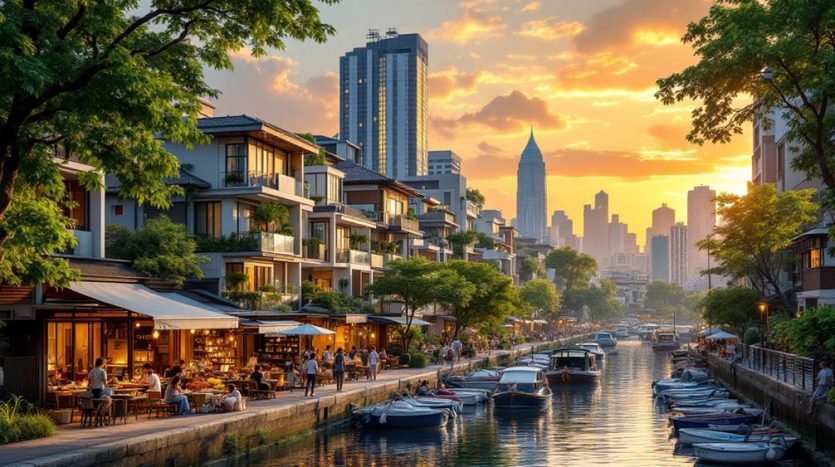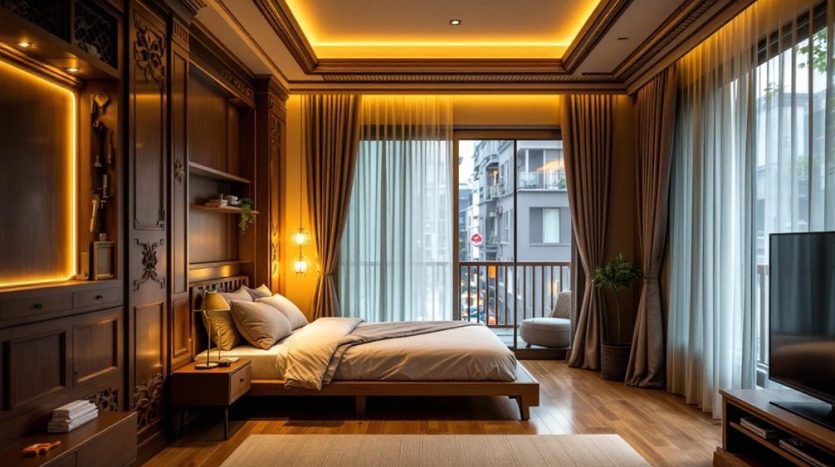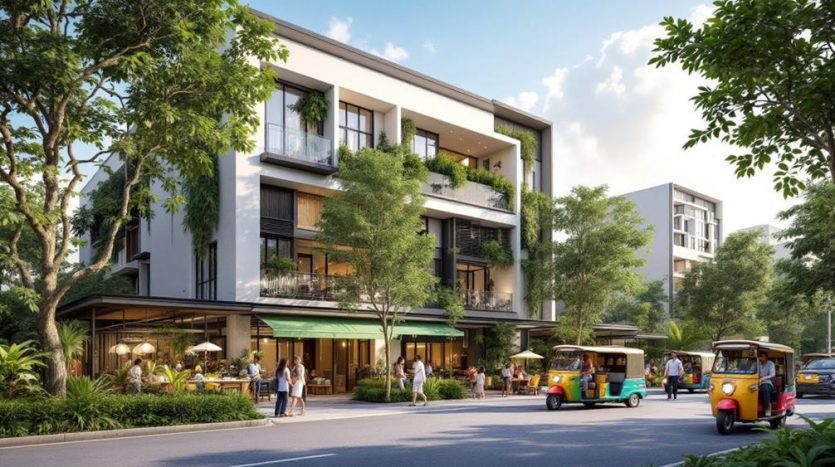How Much Does a 1 Bedroom Apartment Cost in Thailand?
You're probably wondering how much you'll pay for a one-bedroom apartment in Thailand. Prices can really swing depending on where you choose to settle. In bustling Bangkok, you might face a wide range from 12,000 to 40,000 THB, while the more laid-back Chiang Mai offers options starting at 8,000 THB. And then there's Phuket and Pattaya, where costs can surprise you, especially during peak tourist seasons. But what factors truly drive these prices, and how can you make the most of your budget? Let's explore what's behind these numbers and what you need to watch out for.
Key Takeaways
- Bangkok's 1-bedroom apartments range from 12,000 to 40,000 THB, influenced by location and amenities.
- Chiang Mai offers more affordable 1-bedroom rentals, typically between 8,000 and 12,000 THB monthly.
- In Phuket, 1-bedroom apartment prices vary from $300 to over $1,000 monthly, depending on season and amenities.
- Pattaya's 1-bedroom rentals range from 8,000 to 30,000 THB, with beachfront locations costing more.
- Rural areas in Thailand offer 1-bedroom apartments for 3,000 to 8,000 THB, significantly cheaper than urban rates.
Factors Affecting Rental Prices

When examining the factors that influence rental prices for a one-bedroom apartment in Thailand, several key elements stand out. First, location preferences play a pivotal role. You'd be surprised how much a view of the neighbor's goat can cost! Urban areas with bustling nightlife and proximity to public transportation see higher demand, naturally driving prices up.
For example, urban living in Bangkok can result in notably higher costs compared to rural areas. If you're dreaming of a beachfront property, brace yourself (and your wallet) because coastal areas often command premium rates, thanks to the breathtaking vistas that come with a side of sand.
Market trends are another critical factor. As your friendly neighborhood data analyst might say, "It's all about supply and demand, baby!" In recent years, Thailand's growth in tourism and expatriate communities has influenced these trends. Areas experiencing a surge in new developments or popular among digital nomads might see rental prices escalating faster than you can say "pad thai."
Moreover, economic conditions and government regulations can also sway rental costs. It's a complex dance of factors, but understanding these can help you navigate the rental market like a pro—or at least a well-informed tourist.
Just remember, the best deals are often found where you least expect them, like in that charming alley with the world's best street food.
Average Costs in Bangkok
In Bangkok, the average cost of renting a one-bedroom apartment varies considerably based on location and amenities. Bangkok neighborhoods like Sukhumvit, Silom, and Sathorn are among the priciest, where you'll possibly need to auction off a kidney to afford the rent. Meanwhile, areas such as Ladprao and Bang Na offer more budget-friendly options, but you might need to share the space with a few geckos. Here's a cost comparison for your analytical pleasure:
| Neighborhood | Average Monthly Rent (THB) | Quirk Factor |
|---|---|---|
| Sukhumvit | 25,000 – 40,000 | High-end cafes and traffic jams |
| Silom | 20,000 – 35,000 | Skyscrapers and street markets |
| Sathorn | 22,000 – 38,000 | Business hub and rooftop bars |
| Ladprao | 12,000 – 18,000 | Local vibe and fewer tourists |
As you can see, the cost spectrum in Bangkok neighborhoods is as diverse as the city's street food. Consider what you want regarding lifestyle and proximity to work or play. Remember, while Sukhumvit may offer posh amenities, Ladprao might allow you to save a few baht for those mango sticky rice cravings. Choose wisely, and may your apartment hunt be as thrilling as a tuk-tuk ride!
Chiang Mai Rental Prices
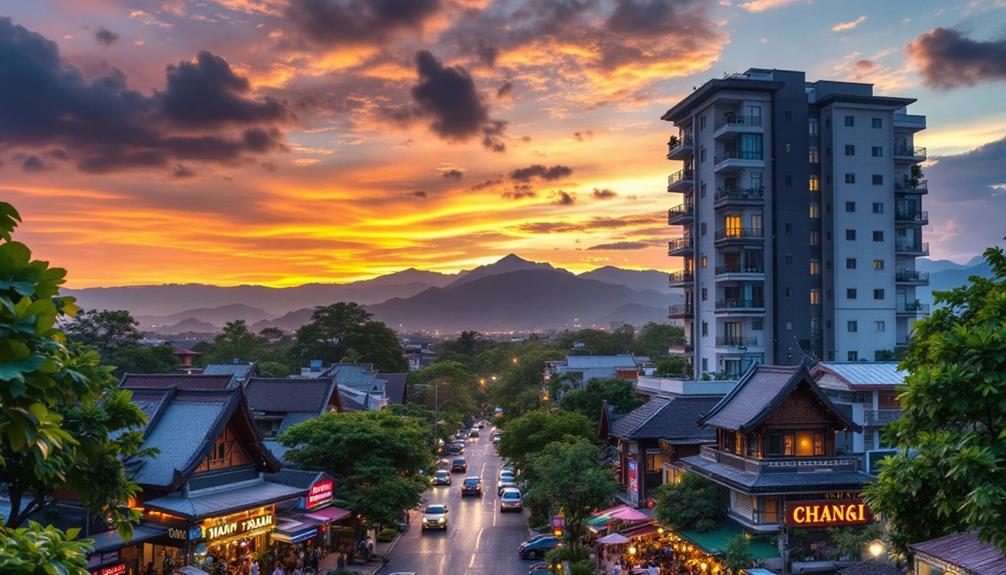
Chiang Mai, known for its relaxed pace and cultural richness, offers a more affordable rental market compared to Bangkok. If you're considering packing your bags and heading north, here's what you need to know about rental prices in this charming city.
1. Average Rent: A 1-bedroom apartment in Chiang Mai typically ranges from 8,000 to 12,000 THB per month. This cost is considerably lower than in the bustling capital, making it a great choice for those seeking a more budget-friendly lifestyle without sacrificing quality.
Additionally, affordable healthcare options in the area contribute to overall cost savings for residents.
2. Lifestyle Differences: With Chiang Mai's laid-back atmosphere, you'll find that life moves a bit slower here. The cost of living aligns with this pace, allowing you to enjoy the local markets, cozy cafes, and scenic temples without breaking the bank.
Local grocery shopping offers further savings, especially when purchasing seasonal produce at the markets.
3. Location Matters: Prices can vary based on the neighborhood. The Nimmanhaemin area, popular with expats and digital nomads, will cost you more, whereas areas like Santitham or Chang Phueak offer similar amenities at a fraction of the price.
Phuket Apartment Costs
When examining Phuket apartment costs, you'll notice rental prices can vary considerably, ranging from $300 to over $1,000 per month.
These variations are often influenced by factors such as location, proximity to beaches, and the building's amenities.
For short-term rentals, you might find fully furnished options that provide flexibility, whereas long-term leases offer stability and potential cost savings through negotiation.
Understanding these elements can help you make more informed decisions when budgeting for housing in Phuket.
Rental Price Variations
Phuket's rental market for one-bedroom apartments exhibits a notable range of price variations, influenced by factors such as location, amenities, and proximity to tourist attractions. If you're thinking of planting your flag on this beautiful island, brace yourself for the dynamic dance of rental costs.
Here's a quick breakdown:
1. Seasonal Fluctuations: Prices can skyrocket during peak tourist seasons. You may find yourself paying a premium for that ocean view during winter months when snowbirds flock to the island.
On the flip side, the rainy season can offer opportunities for lower costs if you're willing to trade clear skies for savings.
2. Location Desirability: Want to be where the action is? Areas like Patong Beach are prime real estate, with rental costs reflecting their desirability.
Alternatively, quieter regions like Rawai might offer more budget-friendly options, assuming you don't mind missing the nightly party scene.
3. Proximity to Amenities: Apartments near shopping centers, restaurants, and other conveniences can command higher prices.
After all, who wouldn't want a steaming bowl of pad thai just a stone's throw away?
Factors Influencing Costs
Several key factors influence the costs of one-bedroom apartments in Phuket, providing potential renters with a range of pricing considerations.
First, there's the location impact to take into account. If you're eyeing a snazzy spot near Patong Beach, prepare your wallet for a workout. Prime locations with beach views or proximity to nightlife hotspots will have you paying a premium. On the flip side, if you're okay with a bit of a hike, areas further inland offer more affordable options.
Economic trends also play a significant role in apartment pricing. When the economy's booming, so are the rental prices. With more tourists and expats flocking to Phuket, demand shoots up faster than your average tuk-tuk. Conversely, during economic downturns, you might find landlords more willing to negotiate, leaving you with extra baht for those sunset cocktails.
Lastly, take into account the ever-entertaining factor of seasonality. High tourist seasons can cause prices to skyrocket like your heart rate during a Muay Thai match. However, in quieter months, you might snag a bargain.
Pattaya Rental Market
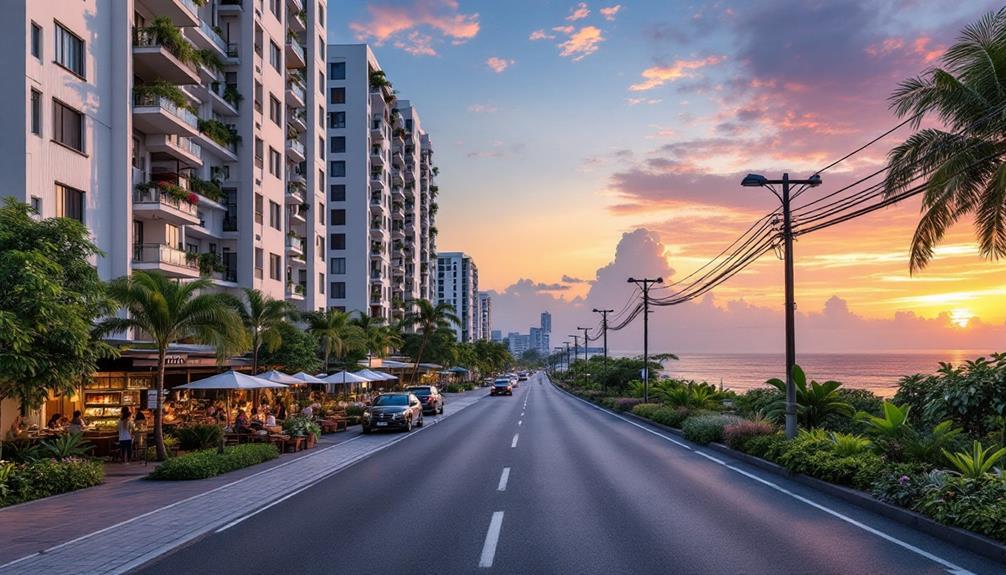
When considering the Pattaya rental market, you'll find that average monthly rent rates for a 1-bedroom apartment range from 10,000 to 20,000 THB.
It's crucial to highlight that foreigners interested in purchasing property in Thailand face foreign ownership restrictions, which make renting an appealing option.
Popular neighborhoods such as Pratumnak Hill and Jomtien Beach offer a variety of options that cater to different budget levels.
Understanding these areas can help you make an informed decision based on proximity to amenities and lifestyle preferences.
Average Monthly Rent Rates
In light of the current rental market dynamics, the average monthly rent for a one-bedroom apartment in Pattaya hovers around 12,000 to 20,000 Thai Baht, depending on factors such as location, amenities, and apartment size.
Understanding the average rent requires dissecting the location impact. Where you choose to live in Pattaya can greatly sway your monthly expenses. Want a sea view? Get ready to pay for it, because ocean breezes don't come cheap.
When analyzing the rental market, consider these key points:
- Proximity to the Beach: Apartments closer to the beach tend to be pricier, as the demand for those Instagram-worthy sunsets is high. You might end up paying a premium just to have sand in your shoes.
- City Center vs. Outskirts: Living in central Pattaya means higher average rents due to convenience and access to amenities. If you're okay with longer commutes and slightly fewer Starbucks, living further out can be budget-friendly.
- Facilities: Apartments with pools, gyms, and security are more expensive. However, if you enjoy swimming without sand and working out while watching Netflix, it's a worthy investment.
Popular Neighborhood Options
As you navigate the rental landscape in Pattaya, choosing the right neighborhood becomes a strategic decision influenced by personal preferences and budget considerations.
Sukhumvit options offer a unique blend of urban convenience and suburban tranquility. You can find a one-bedroom apartment here ranging from 10,000 to 20,000 Baht per month, depending on proximity to amenities. It's like finding a needle in a haystack, but the needle comes with a pool and a gym.
If you're charmed by history and culture, Old Town choices might tug at your heartstrings. With rents between 8,000 and 15,000 Baht, you'll get a sense of nostalgia and perhaps a ghost story or two thrown in for free.
Meanwhile, Beachfront locations, for those who want to wake up to ocean views, can set you back anywhere from 15,000 to 30,000 Baht. Here, your main dilemma will be deciding whether to swim in the sea or the pool first.
Lastly, the Cultural districts offer a vibrant lifestyle with rents around 9,000 to 18,000 Baht. It's perfect if you enjoy art, local cuisine, and the occasional dance-off with the locals.
Comparing Urban and Rural Costs
Examining the cost differences between urban and rural areas in Thailand reveals considerable variations in rental prices for a one-bedroom apartment.
Urban areas, with their high urban density, attract many who crave the hustle and bustle. However, this comes at a price. You can expect to pay anywhere from 10,000 to 25,000 THB monthly in bustling cities like Bangkok. The charm of city life, with all its glitz and glamour, doesn't come cheap, but the urban density guarantees you're never too far from a good pad Thai.
Now, if you're more inclined towards a serene lifestyle, rural Thailand might be your haven. Here, rental prices are notably cheaper, and your wallet will thank you. Imagine paying just 3,000 to 8,000 THB per month. That's what you can expect in rural areas, where lifestyle preferences lean towards tranquility and space.
Here's a quick breakdown:
- Urban living: 10,000 – 25,000 THB/month
- Rural living: 3,000 – 8,000 THB/month
- Urban density impact: Proximity to amenities and activities
Amenities and Their Impact
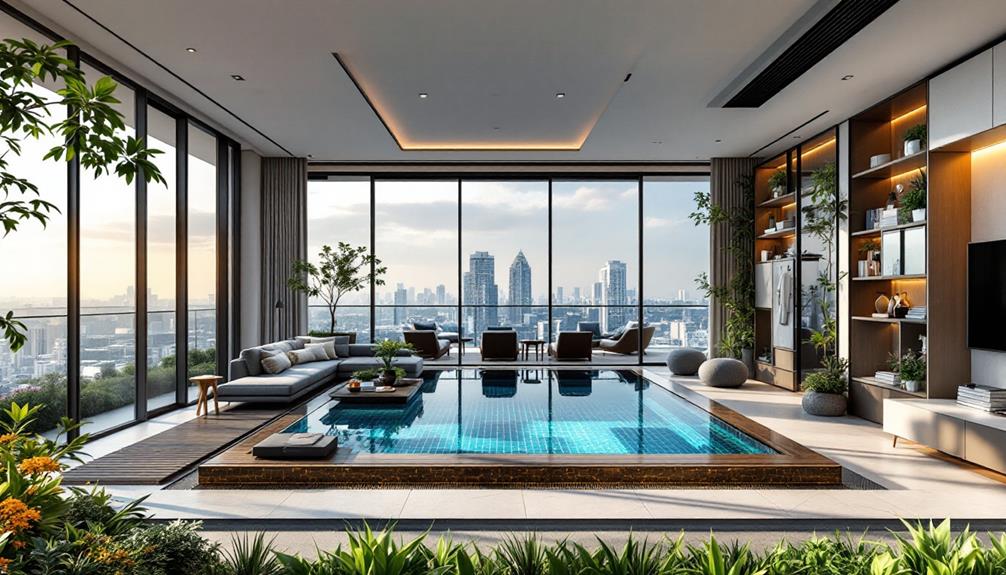
While cost differences between urban and rural areas are apparent, amenities play a significant role in shaping these rental prices. You might think you're just paying for four walls and a roof, but in Thailand, you're often shelling out for much more.
Vital features like air conditioning, a necessity in the tropical heat, and high-speed internet, essential for working remotely or binge-watching your favorite shows, can increase rent by around 10-15%. If you're looking for luxury amenities like a rooftop infinity pool or a gym that rivals a professional training center, expect to add another 20-30% to your budget.
Data shows that apartments in Bangkok with such luxury amenities can cost upwards of 20,000 THB per month, while those with just essential features hover around 12,000 THB.
In contrast, rural areas might offer fewer amenities but at a more wallet-friendly rate. The trick is to balance your desire for luxury with what's genuinely essential. Do you really need that sauna, or is it just a fancy place to sweat?
Short-Term vs. Long-Term Rentals
When deciding between short-term and long-term rentals in Thailand, it's crucial to weigh the financial implications of each option. Short-term rentals offer tempting flexibility, perfect for commitment-phobic individuals who can't decide if they want to live like a local or just visit.
But before you fully embrace your inner nomad, consider these factors:
1. Short Term Benefits: Short-term rentals let you test the waters without drowning in a lengthy lease. You can enjoy furnished apartments, utilities included, and no need to worry about setting up Wi-Fi.
But beware—the convenience comes with a higher price tag. You might pay 20-30% more per month compared to long-term leases.
2. Long Term Stability: If you're ready to settle down and embrace your inner Thai, long-term rentals offer cost savings and stability. You can expect lower monthly rates, often including enticing discounts if you commit to 12 months or more.
Plus, you'll likely build a relationship with your landlord, which could lead to a fruit basket during the holidays.
3. Opportunity Costs: Opting for short-term rentals means sacrificing potential savings and stability.
On the flip side, long-term rentals could trap you in a lease longer than your last romantic relationship. Choose wisely!
Tips for Finding Affordable Apartments
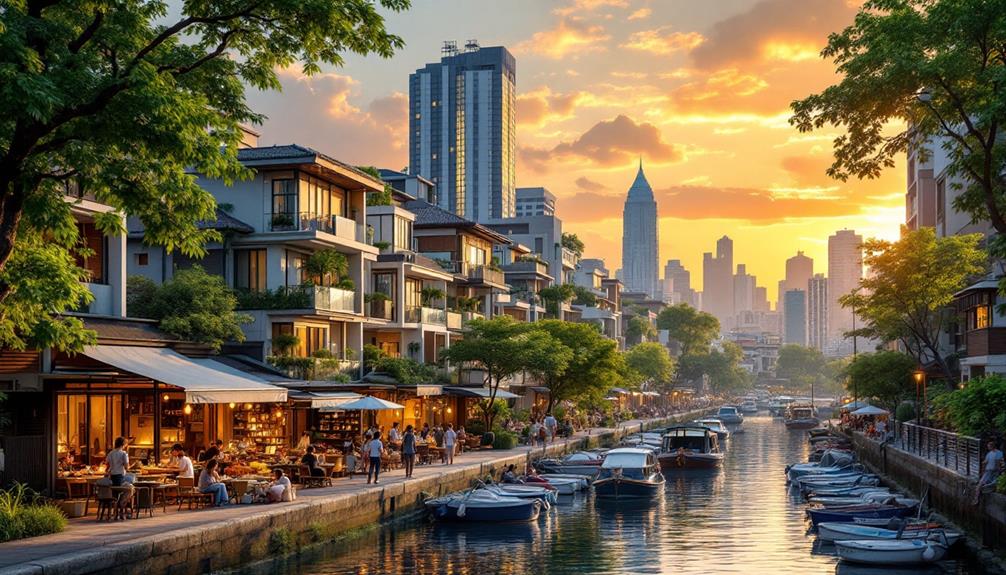
Finding affordable apartments in Thailand requires a strategic approach and knowledge of the local market.
Start by using local resources, such as community boards and local newspapers, where you might find listings and hidden gems that aren't online. Don't underestimate the power of word-of-mouth; locals often know someone who knows someone with a great place.
Online platforms like DDproperty and Hipflat are treasure troves, but they can also be a bit like online dating—pictures can be deceiving, and sometimes 'cozy' means 'you can touch all four walls at once.'
Use these platforms to get a sense of the market rates and available options. Filter listings by price and location to save yourself from falling in love with an apartment that's way out of your budget.
Be analytical: compare prices in different neighborhoods, factoring in transportation costs, nearby amenities, and the all-important proximity to the nearest 7-Eleven (because let's face it, those late-night snack runs aren't going anywhere).
With a data-driven approach and a bit of detective work, you'll find an affordable apartment that checks all your boxes—without needing Sherlock Holmes on speed dial.
Negotiating Rental Agreements
After identifying a suitable apartment, the next step is to tackle the negotiation of rental agreements. You might think you're about to enter a gladiator arena armed only with a pen, but fear not! Negotiation strategies are your shield.
First, familiarize yourself with local market rates. Data from 2023 shows that the average 1-bedroom in Thailand hovers around 15,000 THB. Use this as your baseline.
Now let's break down the lease terms negotiation into three key steps:
- Research: Know your stuff. Landlords respect tenants who know the market. It's like bringing a calculator to a math fight—impressive and effective.
- Timing: Strike when the iron is lukewarm. The off-peak season offers more wiggle room. Landlords are more likely to negotiate during the rainy months when their apartments are as empty as your wallet post-vacation.
- Be Bold but Polite: Politeness is your secret weapon. Ask for a lower rate, longer lease, or inclusions like utilities. Remember, it's not a hostage negotiation; you're just trying to save a few bucks for more pad thai.
With these strategies, you'll navigate the rental agreement maze like a pro.
Hidden Costs to Consider
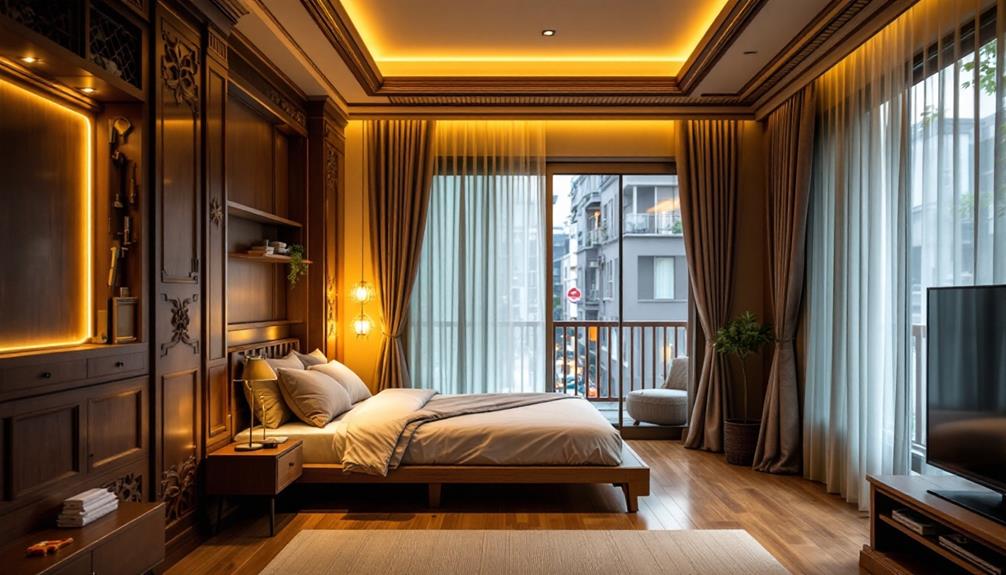
When renting a 1-bedroom apartment in Thailand, don't overlook the hidden costs that can impact your budget considerably.
Utilities and maintenance fees can add 10-20% to your monthly expenses, while rental deposits typically range from one to three months' rent.
Additionally, furnishing and appliance costs can vary widely, potentially increasing your initial outlay by 15-30%.
Utilities and Maintenance Fees
Understanding the hidden costs of utilities and maintenance fees is essential when budgeting for a 1-bedroom apartment in Thailand. You might think you've got your budget nailed down, but these sneaky costs can creep up like a gecko on a mission.
Effective utility management and clear maintenance responsibilities are key to avoiding surprises. Let's break down the main culprits:
- Electricity and Water: Expect to pay around 1,500 to 3,000 THB monthly, depending on air conditioning usage. Pro tip: learn to love the fan. It's cheaper and doubles as a white noise machine.
- Internet and Cable: High-speed internet can cost between 600 to 1,200 THB per month. Remember, streaming your favorite shows takes bandwidth, so choose wisely unless you want to experience buffering as a lifestyle choice.
- Maintenance Fees: Depending on the building, you might pay 500 to 2,000 THB monthly. These fees cover common area upkeep, so if the elevator's stuck, at least your money is working harder than that button you keep pressing.
Rental Deposit Requirements
Renting a 1-bedroom apartment in Thailand often involves maneuvering through various upfront costs, with rental deposit requirements being a significant consideration. Typically, landlords will ask for one to two months' rent as a security deposit, which can feel like a money-sucking black hole at first glance.
You might think you're making a down payment on a small island instead of securing a cozy living space. But don't worry, these security deposits are standard practice and protect landlords from any potential damage or unpaid rent under the lease agreements.
Now, let's get into the nitty-gritty. Statistically, about 80% of rental contracts in Thailand will outline these requirements clearly.
When you sign the lease agreement, check for clauses that specify the conditions under which you'll get your deposit back. If you can manage not to throw any wild parties that involve fire-breathing or indoor skydiving, you should be fine.
Furnishing and Appliance Expenses
While secure deposits are a major upfront cost, furnishing and appliances often present hidden expenses that can catch renters off guard.
Before you start unpacking your socks, take a moment to reflect on the financial impact of turning an empty space into a cozy haven.
First, let's talk about varying furnishing styles. In Thailand, you can choose from minimalist to ornate, with prices ranging from $200 for basic furnishings to over $3,000 for designer pieces. It's like deciding between a plain rice dish and a five-star gourmet meal.
Next, appliance brands can greatly affect your budget. Here's a breakdown to keep you from sweating more than necessary:
- Fridge: Basic models start at $300, while high-end brands like Samsung can set you back $1,000.
- Washing Machine: An entry-level model costs around $150, but if you're eyeing LG or similar brands, expect to pay up to $600.
- Air Conditioner: In Thailand's tropical climate, this is a must, costing anywhere from $400 for a no-frills model to $1,200 for a brand like Daikin.
